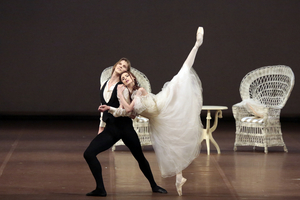Review: THE LADY OF THE CAMELLIAS, Bolshoi Ballet in Cinemas
An highly emotional version of John Neumeier's creation returns to the big screen

![]() After a beautifully lyrical version of Romeo and Juliet, Russia's Bolshoi Ballet returns to our cinema screens on November 1 with a highly emotional version of John Neumeier's Lady of the Camellias. Created in 1979 for the Stuttgart Ballet, the Bolshoi has been performing this intensely poignant piece since 2014.
After a beautifully lyrical version of Romeo and Juliet, Russia's Bolshoi Ballet returns to our cinema screens on November 1 with a highly emotional version of John Neumeier's Lady of the Camellias. Created in 1979 for the Stuttgart Ballet, the Bolshoi has been performing this intensely poignant piece since 2014.
Based on Alexandre Dumas' 19th century novel, the story inspired Verdi's opera La Traviata, the Oscar-winning musical Moulin Rouge, and numerous other ballets, plays and films. The story begins at an auction in 1847 where objects belonging to courtesan Marguerite are being sold. A man called Arnaud enters and then their story is told through a series of flashbacks.
We see Marguerite and Armand meet for the first time at a performance of Manon Lescaut, and the opera's two lovers, Manon and des Grieux, appear throughout the ballet to Marguerite as a vision, reflecting her own experience. Marguerite and Arnaud fall in love but Marguerite insists the relationship remains secret so she can maintain her opulent lifestyle. Illness and social pressures stalk the pair, ultimately leading to inevitable tragedy.
As Marguerite, Principal Svetlana Zakharova avoids melodrama and rises to the emotional requirements of the role. She begins aloof and chilly, moving to a joyful expression at falling in love in the second act pas de deux, after she has renounced the relationship with her patron. This is matched by her devastation when later she is forced to forsake Armand. She shows great acting skill, particularly in act three where she has little dancing to perform, relying on her gestures and face to convey the anguish at her impending death.
Principal soloist of the Hamburg Ballet, Edvin Revazov, shows both ardent love and deep grief as an innocent Armand. He is a very technical dancer and his lifts are effortless. He also demonstrates great grace and elegance along with Zakharova's exquisite lines.
In many ways, the ballet revolves around three lengthy and central pas de deux which occur in each act, showing the development of the relationship between Marguerite and Armand. The pair have a beautiful and natural chemistry which grows from what is their first meeting, to falling in love to their last passionate embrace.
Anna Tikhomirova and Semyon Chudin are both wonderful as Manon and Des Grieux. Tikhomirova expresses a heart-breaking move from detached and cold to a tired and broken woman as her outfits become progressively more ragged.
Anna Antropova danced Nanina, Marguerite's maid, and stood out for showing great expression in her short appearances.
After a rather lengthy start at the auction, heightened emotion is evident throughout this production. It is also an insight into the impressive stamina of the company. This is an intense and long piece, but the attention to detail and focus never drops.
Jurgen Rose's staging is sparse, with a blank backdrop which changes colour subtly to reflect the scene changes. The screening for cinemas is generally well-framed, although there are a few too many close-ups, which loses the wider view of stage too often and seems to truncate the movement.
The ballet samples many of Chopin's most famous nocturnes and sonatas. It is exquisitely romantic and melancholy, played by two pianists; Alexei Melentiev on stage and Pyotr Chukhnov in the orchestra pit. In the final scene, Marguerite dies alone as the last tones of "Largo from Sonata in B minor" fade away. It is quietly shattering.
This is a romantic and deeply poignant ballet, demonstrating the absolute precision for which the Bolshoi is justly famous.
The Lady of The Camellias is in cinemas on November 1
Photo Credit: Damir Yusopov
Reader Reviews

Videos

